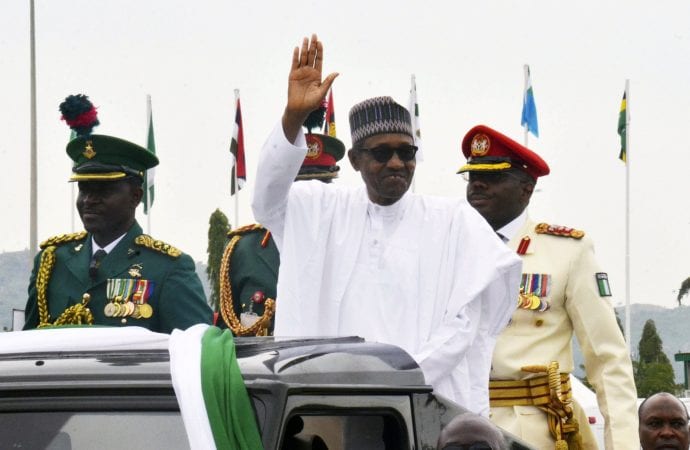President Muhammad Buhari has “failed woefully in his fight against corruption,” according to Catholic leaders in Nigeria.
Buhari came to power in 2015 promising to undo the endemic corruption in the country and was reelected earlier this year, again promising to root out the endemic graft that has plagued the African nation for decades.
Josef Ishu is the editor of the Good Shepherd, the newspaper of the Archdiocese of Abuja, the Nigerian capital. He told Crux that the Nigerian president hasn’t really tried to tackle corruption.
“Instead, his administration is busy persecuting perceived enemies of his government. Besides, there are some monies recovered from individuals, where are those monies? Buhari government is busy intimidating the judiciary arm of government. In my candid thinking, he has not done much in the fight against corruption.”
The Archbishop of Abuja, Cardinal John Onaiyekan, has also recently spoken against graft in the country.
Speaking earlier this year during a keynote address at the Catholic Laity Council of Nigeria political conference in Abuja, the cardinal said runaway corruption was at the base of the debasement of human life in Africa’s most populous country.
Onaiyekan said the greed of those trusted with public money means ordinary people can’t have access to basic services.
“As always, it is the poor people who are most affected; who die every day from basic illnesses that are a thing of the past in many countries of the world, including in Africa,” he said.
“Since the return to democracy, corruption in Nigerian politics has remained both endemic and systemic. Politics is largely seen as the easiest avenue for quick wealth and easy money. It is construed with a cafeteria mentality as a place where people are invited to come and eat,” the cardinal said.
“Any politician who does not get rich is a fool and not many Nigerians want to be fools. The mismanagement, embezzlement, looting of our national resources is one of the most brazen stealing bazaars anywhere in the world. Nowhere else in the world do leaders and citizens tolerate this sort of theft in broad daylight with nothing happening to the thieves,” Onaiyekan said.
Ishu explained that part of the problem is the exploitation of ethnic identities by politicians for personal gain.
“It is a known fact that in Nigeria, politicians would always use political and ethnic identities for personal gains. Not only that, they use religion: Muslim-Christian factor. Our politicians don’t know the essence of governance. For them, politics is business for personal aggrandizement not for the development of their people,” he told Crux.
“It is a concern of every meaningful Nigerian or those who live and do business in the country,” Ishu said.
Such disparities, according to Ishu, are made worse by the country’s overdependence on oil. Petroleum accounts for 81 percent of Nigerian total exports.
In 2016, when the price of oil dropped to $30 a barrel, the local currency collapsed, and one report showed Nigeria overtaking India as home to the largest population of people living in extreme poverty, with 87 million people living on less than $1.90 a day.
The situation is likely to get worse, with projections showing that nearly 100 million Nigerians are in danger of falling into extreme poverty by 2022.
Ishu says Nigeria has more than oil and could harness its vast resources for national development.
“Don’t forget that this oil will dry up one day,” he told Crux.
“We have great potentials in agriculture and if this is taken very serious, Nigeria can rule the world in terms of export of food and this can also guarantee food security for the country and boost our economy. There are other areas like in some parts of northern Nigeria; there are a lot of mineral resources untapped. We have rocks in Nasarawa and Plateau states, even in Abuja that can be turned into something useful and boost Nigeria’s economy, but everybody is depending on oil. State governors lack initiatives to turn around things in their states. So, Nigeria is really at risk,” Ishu continued.
But to tap into such resources, Nigeria needs to deal with the mounting security challenges. The Islamist group Boko Haram continues to wreak havoc in the country’s northeast, Fulani tribesmen attack farming communities in the country’s Middle Belt; and armed bandits plague the oil-rich south. Ishu said the Buhari government has more work to do to rescue the country “from the brink.”
“So Buhari should do more in this regard. The primary purpose of governance, they say, is to safeguard lives and property. Nigerians are hungry. A country of over 200 million people, only a few can feed well. It’s a cause for concern,” Ishu said. “Buhari should step up strategy on how to create a better and secure environment for investors to come in and create jobs. Lastly, corrupt leaders should be jailed as a deterrent to others. I ask, since the return to democracy, how many of our corrupt leaders have been jailed. They are walking on our streets insulting the sensitivity of the taxpayers.”

